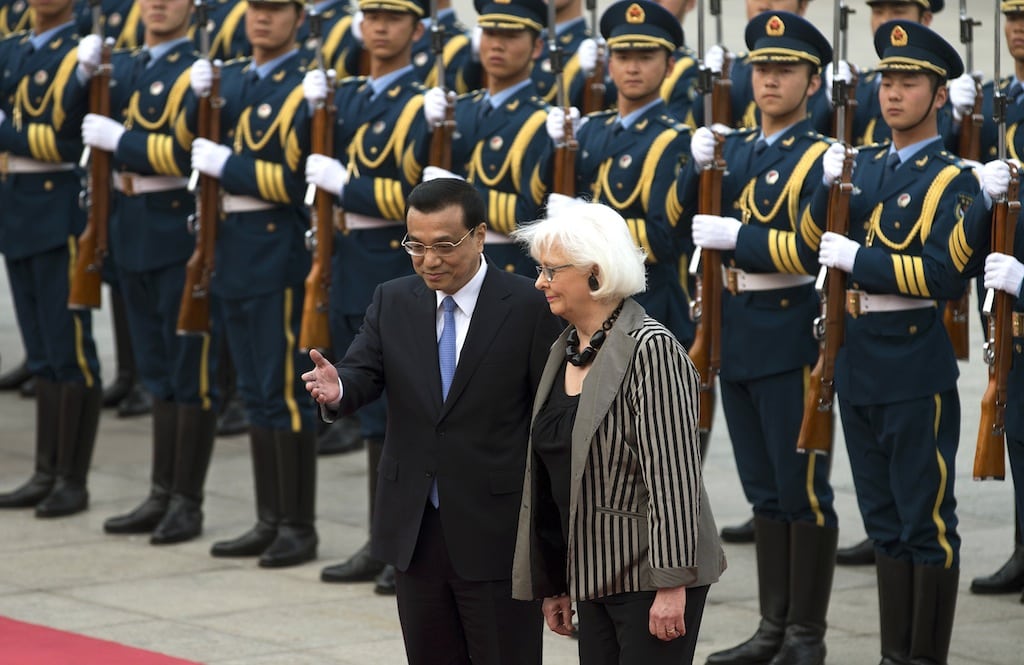Skift Take
Iceland's concern over the mega-resort a Chinese tycoon had planned has given way to a much more open relationship that will see the Arctic nation take advantage to get the best of the Chinese and a concerned Europe.
China and Iceland signed a free trade agreement Monday, offering hope to the small North Atlantic country for its recession-battered economy and giving Beijing a leg up in its drive for expanded influence in the Arctic.
The China-Iceland free trade pact will lower tariffs on a range of goods and is expected to boost seafood and other exports from the remote Nordic state to the world’s second-largest economy. It comes at the start of a five-day visit to China by Icelandic Prime Minister Johanna Sigurdardottir that highlights her country’s attempts to diversify an economy that was badly mauled by the bursting of a massive financial bubble in 2008.
Chinese Premier Li Keqiang told Sigurdardottir the agreement was “a major event in China-Iceland relations.”
“It also signals the deepening of our relationship, especially our economic relationship which has been lifted to a new height,” Li said during talks following a formal welcoming ceremony at the Great Hall of the People in the center of Beijing.
Trade between China and the England-sized country of just over 315,000 people rose 21.1 percent last year to $180 million, according to the Chinese Ministry of Foreign Trade. Iceland exports mostly fish to China and imports Chinese products from ships to shoes. Sigurdardottir has been keen to push Icelandic services and the island’s geothermal energy potential.
Iceland has unique importance to China as it attempts to gain a foothold in the Arctic, where melting ice is opening passages for shipping and could create a boom in extraction of resources such as gas, oil, diamonds, gold and iron.
China is seeking permanent observer status in the Arctic Council, an eight-nation body that includes Iceland and decides on policy in the region. China is expected to be accepted when a final decision is announced next month, drawing support from the prospect of heavy Chinese investment in the region’s mining industries as advertised by its proposal to sink $2.3 billion into Greenland to secure 15 million tons of iron ore per year.
Shipping via the Arctic, meanwhile, would cut about 6,400 kilometers (4,000 miles) and two weeks off the journey between northern Europe and Shanghai. Seeking to prove the route’s viability, Chinese researchers last August completed their first 30,000-kilometer (19,000-mile) journey between Iceland and Shanghai.
China sees a range of opportunities in the Arctic and will continue to expand its research in the area and conduct further expeditions, said Leiv Lunde, director of the Oslo-based Fridtjof Nansen Institute.
“It’s attractive also for all the resources but China is already a major shipping nation … and Chinese companies are now very eagerly awaiting policy signals from the Chinese government on what kind of priorities they will give to the Arctic,” said Lunde, who was attending a conference Monday on Arctic issues in Shanghai.
China’s desire for a presence in the Arctic has prompted an unusual degree of interest in Iceland. China recently completed what is far-and-away the largest embassy complex in the Icelandic capital Reykjavik, reportedly capable of accommodating a staff of 500. Wen Jiabao, China’s premier until a leadership transition was completed in March, included a rare stop in Iceland on a visit to Europe last year.
It hasn’t always been smooth sailing, however. Chinese investor Huang Nubo has been stymied in his bid to build an adventure tourism resort on a barren patch of northeastern Iceland that would include an airport, golf course, and 120-room hotel.
Iceland rejected his original bid to purchase the land that comprises 0.3 percent of Iceland’s territory, prompting an angry Huang to blame Western prejudice and unfounded suspicions that he was a tool of the Chinese military. Icelandic officials have said they don’t see the resort as viable and Huang has said he would drop the project unless he gets approval by the end of May.
Xu Hong, deputy general manager of Huang’s Zhongkun Investment Group, said the company remained in contact with the landowner and Icelandic government.
“We’re optimistic that we’ll be able to have the response by the end of May,” Xu said.
Xu said no meetings were planned between Huang and Sigurdardottir during her visit.
Associated Press writer Louise Watt contributed to this report.
Copyright (2013) Associated Press. All rights reserved. This material may not be published, broadcast, rewritten, or redistributed.
![]()
The Daily Newsletter
Our daily coverage of the global travel industry. Written by editors and analysts from across Skift’s brands.
Have a confidential tip for Skift? Get in touch
Photo credit: Iceland's Prime Minister Johanna Sigurdardottir, right, is shown the way by Chinese Premier Li Keqiang after inspecting a guard of honor during a welcome ceremony outside the Great Hall of the People in Beijing Monday, April 15, 2013. Andy Wong / Associated Press
